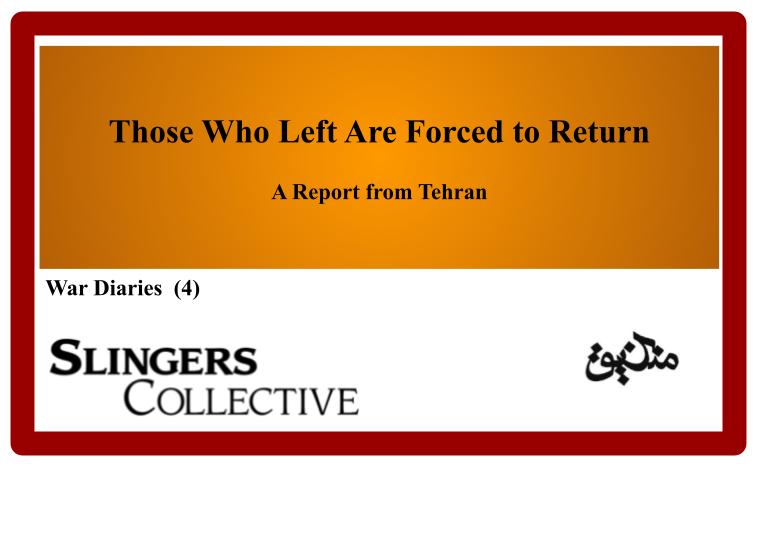War Diaries 4
June 21, 2025
A Report from Tehran
Between two internet disconnections, we hear the voices of comrades. Amid days of bombs and tragedy, in a situation where they can’t sit down and write reports, not because they lack time, everything is suspended these days, but writing, even just a couple of paragraphs, requires a level of peace and concentration that is absent. Therefore, it’s in these intervals that we hear their words.
A comrade says, “Two nights ago, Tehran was like doomsday. It was a completely new situation. It started at eight or nine in the evening. In previous nights, it was usual for anti-aircraft to work for five minutes, ten minutes; then it would go on until three or four hours later. But two nights ago, it started at eight or nine in the evening and continued relentlessly until two or three in the morning.” This refers to the extensive attacks of June 19, during which many neighborhoods in Tehran were hit. According to the comrade, the intensity of the bombardments and counter-attacks was so severe that during those few hours, the entire sky of Tehran was illuminated.
The comrade says: “Checkpoints have become more intense. I mean, when you go out at ten at night, ninety percent of the people are in plainclothes. They’re either on foot, on motorbikes, in cars, or standing at the checkpoints, all of them armed, each at least carrying a Kalashnikov on their back. If you’re on foot and carrying a backpack, they will 100% stop you.”
The mass departure of many Tehran residents has led to food shortages, as many food suppliers have also left the city. “Out of ten bakeries, only two are open, and even there, about three hundred people are standing in line. And they don’t give out much to each person.” Another issue is access to cash: “ATMs aren’t dispensing money. You have to go a long way and try fifty different machines just to get 200,000 tomans in cash.”
The psychological state the comrade describes is laced with irony: “Psychologically, we’re at a point where you get up to go to the bathroom, and you’re thinking, ‘I’d better finish quickly, because if a missile hits three seconds from now, at least I won’t die in here.’”
Still, the comrade has decided to stay in Tehran. When we ask if the comrade wants to leave, the comrade says: “No! Honestly, I’m staying. Part of it is psychological. Leaving here, detaching from this place, it just feels wrong, even though I know it’s not rational. But that’s how it is. And part of it is that maybe I can be of some help.” And these forms of help, of course, are small. The comrade gives an example: “A few nights ago, I was out on the street until five-thirty in the morning. I was walking home as the sky was getting light. I saw an old man sitting on the sidewalk, very elderly, maybe eighty or ninety years old, just crying for no reason. I passed by him, then turned back. I said, “Sir, are you okay? Do you need help? What’s wrong?” And then he broke down again, sobbing uncontrollably. He said, “I’m alone. My children aren’t in Iran. I don’t know what to do. I’m scared.” So, I sat with him and talked for a bit. At least for that moment, he calmed down a little.” And that’s what keeps the comrade in Tehran, because as the comrade says “I think if I leave Tehran, I won’t be able to find peace at all.”
The comrade believes that those who have left will eventually be forced to return. The comrade says: “I think starting this week, people will have to slowly begin coming back. Office workers and the like might be able to take some leave, but those who have to pay rent, pay installments, after a week or ten days, they’ll have to return. Otherwise, how are they supposed to survive? Even those who, with great difficulty, have some savings, eventually their savings will run out. And it’s not like the banks are going to say, “We’re forgiving loan payments,” or “We’re postponing them for this long.” Landlords still want their rent. People calculate all this and naturally come to the conclusion that they have to return. They’ll come back, and when we hear the air defenses, we’ll just go to the neighborhood park. So, I think a wave of return will start forming. Of course, it depends on the person, some might be able to stay away for a month or two, but poorer people really have no choice but to come back.”
The final image of this short report bears an inevitable resemblance to apocalyptic films, with the crucial difference that this is not a movie. These are scenes transmitted from a real land, with real people, while the leaders of the “free world” and much of its monarchist and republican opposition are whistling for more and heavier bombings: “At night, there’s no sound. Everything is quiet and still. Last night I went to the window and saw a boy, four apartments over, come to his window. I waved, but he didn’t see me. I started whistling, and finally he saw me, and we waved at each other. It was exactly like a scene from The Last Survivor. The streets are so empty. The city is empty. So empty that you can see the sky over Tehran filled with stars, and it’s really beautiful. This miserable city, in the midst of catastrophe, with its residents living through disaster, is still breathing.” And yet our breath is caught, held, from staring into the darkness of day.



Comment here